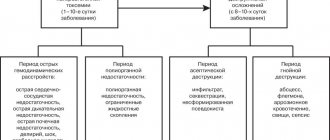How to recognize intestinal obstruction
- Abdominal pain is the very first and characteristic sign; it can be sudden, cramping in nature, and, as a rule, its appearance does not depend on food intake. At first, attacks are repeated at certain intervals, which is associated with intestinal peristalsis, but then the pain becomes constant. When the intestine is strangulated or torsion, the pain becomes more intense during a wave of peristalsis. An alarming symptom is a decrease in pain; imaginary well-being indicates a cessation of peristalsis and the development of intestinal paralysis. The pain caused by obstruction due to paralysis is in most cases dull and bursting.
- Stool retention and failure to pass gas are a typical sign of low obstruction. But stool may appear in the first hours with mechanical compression, paresis or narrowing in the upper intestines, as well as with partial intestinal patency.
- Vomiting is a characteristic symptom, it can be repeated, not bringing relief, possibly with intestinal contents, increasing as intoxication increases.
- Bloating and asymmetry of the abdomen, peristalsis, which gradually subsides.
Almost always appear: weakness, lack of appetite, apathy, signs of intoxication. It is necessary to take into account that the manifestations of the disease may vary and depend on a number of factors, so the only correct decision is to seek medical help. If you have any questions, just call us and our specialists will tell you what to do.
Forecast
The prognosis in the absence of metastases to regional lymph nodes is optimistic. The five-year survival rate is about 80%. In the presence of metastases to regional lymph nodes, about 25% of patients live for more than five years.
When the first signs of colon dysfunction appear, make an appointment with an oncologist at the Yusupov Hospital by calling the contact center phone number. Detection and treatment of colon cancer at an early stage of the disease improves the prognosis and promotes cure for the patient.
Make an appointment
Why is intestinal obstruction dangerous?
Due to dehydration and impaired digestion and absorption of food, the balance of salts, acids and alkalis in the body is disrupted, which leads to dysfunction of almost all organs. Metabolic products are not excreted from the body, which leads to an increase in intoxication; the situation is aggravated by the process of decay and the appearance of pathogenic microflora in the intestines. Necrosis develops in the intestinal wall, and the intestinal contents enter the abdominal cavity, resulting in peritonitis. In this case, the development of sepsis and failure of many organs is likely, which will lead to the death of the patient.
Cause of the disease
Scientists have not yet established the exact cause of colon cancer. A malignant tumor can develop against the background of precancerous diseases: familial and acquired polyposis, villous tumors and adenomatous polyps. Researchers include the following pathological processes as factors that provoke tumor formation:
- Amoebiasis;
- Nonspecific ulcerative colitis;
- Diverticulosis.
The disease can develop due to poor nutrition and food composition. The tumor develops more often in people who eat large amounts of meat and meat products. Internal flora can produce carcinogenic substances from animal fats. The formation of a tumor is also caused by a violation of the passage of intestinal contents with insufficient consumption of fresh vegetables, fruits, and foods that contain a large amount of fiber.
Intestinal obstruction, what to do?
If intestinal obstruction is suspected, urgent hospitalization of the patient in the surgical department is necessary. Before the doctor arrives, it is strictly forbidden to take painkillers or laxatives, perform gastric lavage, etc.
Metastases
Colon cancer most often metastasizes to regional lymph nodes not immediately, but after a long time after tumor development.
The tumor often grows into neighboring tissues and organs. Colon cancer is generalized, with penetrating metastases to the lungs, liver requires consultation with a thoracic surgeon, hepatologist surgeon. Unresectable colon cancer is characterized by tumor growth into bone structures and great vessels. The possibility of tumor removal is being assessed; if surgery is not possible, palliative treatment (chemotherapy) is used.
Initially resectable metastatic lesions are removed surgically, followed by palliative chemotherapy. Also, as a treatment, systemic chemotherapy is carried out before surgery to remove metastases, and after surgery, chemotherapy treatment is continued.
Patients with contraindications to surgery - is it possible to help?
As for weakened patients, in cancer patients with severe exhaustion, the absence of stool for a couple of days is acceptable. All other patients, including those with neurological pathologies, for example, those suffering from Alzheimer's or Parkinson's disease, require urgent hospitalization; in case of intestinal obstruction, such patients should be under constant medical supervision. In this situation, surgery is prescribed as a last resort - if it was not possible to alleviate the patient’s condition within 2-3 days, as well as if there is a risk of developing coprostasis. If surgery is contraindicated, then colon stenting using endoscopic equipment is possible as palliative treatment. All manipulations are carried out through a natural opening: a balloon is inserted into the intestinal lumen, expanding the narrowed section of the intestine, after which a stent is installed. In this way, it is possible to avoid or postpone abdominal surgery in an inoperable patient, improving his quality of life.
Intestinal obstruction is a dangerous condition, the outcome of which depends on timely medical care. But complete recovery, even in severe cases, is possible if the patient is urgently hospitalized in the surgical department. Therefore, when the first symptoms appear, contact us immediately - this way you can avoid serious consequences, or even save your life; everything depends on you!
Complications
Colon cancer causes severe and life-threatening complications:
- Bleeding;
- Intestinal obstruction;
- Perforation (perforation of the intestinal wall);
- Growth of the tumor into neighboring organs;
- Inflammation of the tumor.
Bleeding from the colon in the presence of a malignant neoplasm is rarely profuse. Basically, blood is mixed with feces and determined using laboratory tests.
Intestinal obstruction in most patients is the first manifestation of the disease. It is an obstructive intestinal obstruction (a growing tumor narrows the lumen of the colon).
Intestinal perforation poses a great danger to the patient. Perforation occurs either in the area of the tumor during ulceration or decay, or proximally (above) it as a result of excessive stretching of the intestinal wall with contents. When a colon tumor perforates, the patient's condition sharply worsens and fecal peritonitis develops, often with a fatal outcome.
Great difficulties for diagnosis and treatment are inflammatory and suppurative processes in the tissue that surrounds the tumor of the colon. The infection most often affects the retroperitoneal tissue of the ascending and descending colon, which lack a serous membrane. In the presence of inflammation, patients complain of pain in the lower back and posterior abdominal wall. Their body temperature rises. During palpation, doctors determine muscle tension and pain in the anterior abdominal wall and lower back.
Make an appointment
Advantages of the Hospital Center
Individual treatment regimen for each patient
For each patient, it is mandatory, even at the pre-hospital stage, that an individual treatment regimen is developed, taking into account all the characteristics of the body: age, health status, medical history, etc. – this approach allows you to minimize risks both during surgery and in the postoperative period, and as a result, ensure the fastest possible rehabilitation with a minimum period of hospital stay.
Multidisciplinary approach
The medical staff of the Hospital Center is a single team made up of expert doctors of different specializations, which allows for a multidisciplinary approach. We treat the patient, seeing in front of us not a list of diseases he has, but a person whose problems are interconnected and interdependent. The therapeutic measures taken are always aimed at overall improvement of the patient’s health, well-being and quality of life, and are not limited to eliminating the symptoms of a specific disease.
Surgical treatment of any level of complexity
The operating doctors of the Hospital Center are proficient in advanced and high-tech methods of performing operations. The combination of highly qualified doctors and innovative equipment allows for surgical treatment of the highest level of complexity.
High-tech, minimally invasive treatment methods
The basis of the treatment methodology carried out at the Hospital Center is the principles of minimizing risks for the patient and the fastest possible rehabilitation.
The implementation of such an approach is possible only by using the most high-tech techniques, modern equipment and the application of the latest achievements of medical science.
The qualifications of doctors combined with modern equipment allow us to successfully implement this approach to treatment.
Fast-track surgery
Fast-track is a comprehensive technique that allows you to minimize the length of a patient’s stay in the hospital without compromising the quality of treatment.
The approach is based on minimizing surgical trauma, reducing the risk of postoperative complications and accelerating recovery after surgery, which provides our patients with a minimum hospital stay.
Thanks to this approach, even complex operations such as cholecystectomy require a hospital stay of no more than 3 days.
Personal medical supervision in the postoperative period
To completely exclude the development of possible complications, the early postoperative period is spent in all patients, regardless of the complexity of the operation, in the intensive care unit under the individual supervision of a resuscitator.
The transfer of the patient to the ward is carried out only in the complete absence of even the minimal possible risks.
Informing relatives 24/7
We are as open as possible and show care not only for the patient, but also for his loved ones. Information about patients' health status is provided to relatives seven days a week, 24 hours a day.
Visiting patients is also possible at any convenient time.
Highly comfortable single and double rooms
Patients are offered spacious, comfortable rooms for single and double occupancy, equipped with everything necessary for rest and recovery.
In the children's department, our young patients are accommodated together with their parents.
Tax deduction
According to the tax legislation of the Russian Federation, each patient has the right to compensation of up to 13% of the amount spent on his treatment, as well as the treatment of close relatives.
Our specialists will prepare for you a package of documents for the tax office for a refund of 13% of the amount of treatment expenses, and will also give recommendations on various ways to interact with the tax office.
Our doctors
Prokhorov Yuri Anatolievich
Surgeon, head of the surgical service of CELT, candidate of medical sciences, doctor of the highest category
33 years of experience
Make an appointment
Lutsevich Oleg Emmanuilovich
Chief Surgeon of CELT, Honored Doctor of the Russian Federation, Chief Specialist of the Moscow Department of Health in Endosurgery and Endoscopy, Corresponding Member of the Russian Academy of Sciences, Head of the Department of Faculty Surgery No. 1 of the State Budgetary Educational Institution BPO MGMSU, Doctor of Medical Sciences, Doctor of the Highest Category, Professor
43 years of experience
Make an appointment
Gordeev Sergey Alexandrovich
Surgeon, Candidate of Medical Sciences, doctor of the highest category
42 years of experience
Make an appointment
Fedorova Elena Vladimirovna
Surgeon, Candidate of Medical Sciences, doctor of the highest category
22 years of experience
Make an appointment
Preventive actions
The effectiveness of treatment depends on the etiology of the disease and the qualifications of the surgeon, because accurate diagnosis and timely and correct treatment measures minimize the likelihood of complications. It is also necessary to take into account the age of the patient: older patients have an increased risk of complications.
Prevention is aimed at treating diseases that cause intestinal obstruction:
- control of helminthiasis;
- timely diagnosis and removal of tumors;
- prevention of adhesions;
- preventing traumatic injuries;
- healthy eating;
- the right way of life.
The multidisciplinary clinic CELT has a powerful diagnostic and treatment base and experienced specialists of the highest level.
Colon stenting
If surgical treatment is not possible, a stent can be installed in the intestine - a hollow metal or polymer cylinder with a mesh wall. It expands the lumen of the affected area of the intestine and helps restore patency. There is no need to make an incision to place a stent. The procedure is performed endoscopically, for example, during a colonoscopy (installation of a stent in the colon) or FGDS (in the duodenum).
Treatment
In most cases, urgent surgery is necessary.
However, all types of dynamic obstruction are subject to conservative treatment, which includes ensuring the patency of the gastrointestinal tract using enemas, removing intestinal contents with a nasogastric or nasointestinal tube, correcting water and electrolyte disturbances, monitoring hemodynamics, normalizing peristalsis, detoxification and antibacterial therapy.
Have questions?
Leave your phone number and we will call you back









